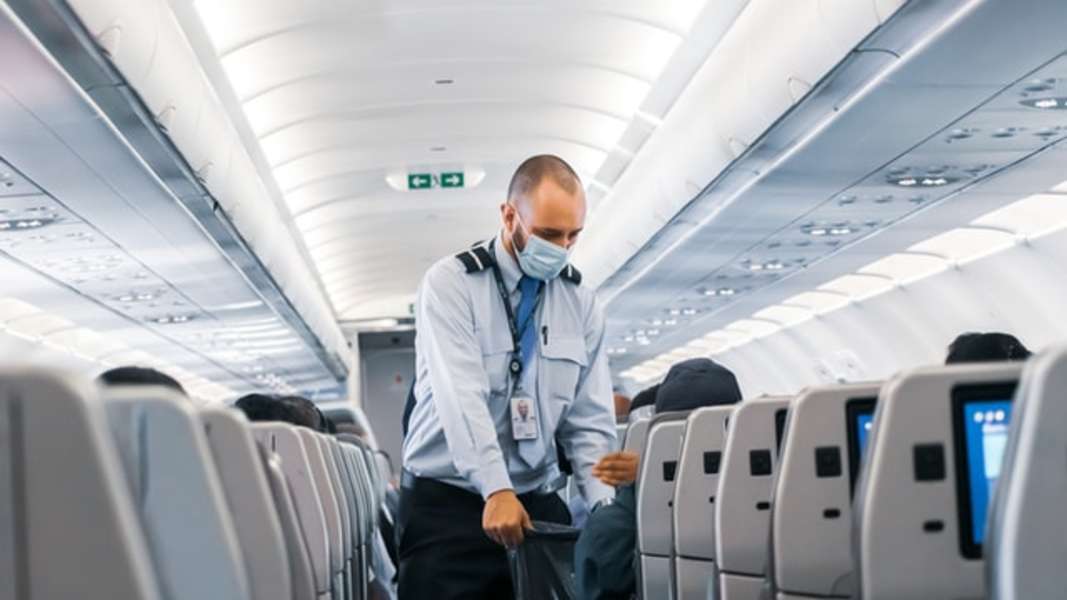What is a cabin crew aptitude test?
A cabin crew aptitude test is a series of psychometric tests used by airlines to ensure they only hire flight attendants with the relevant set of strengths and skills.
Before taking any aptitude tests, you’ll need to fill out an online application form detailing your experience, education and personal information.
If your application is successful, you’ll then be invited to take the aptitude tests.
Which tests you’re asked to take depends on the cabin crew training programme or the airline you’re applying for. They could include any of the following:
- Numerical reasoning test
- Verbal reasoning test
- English language test
- Situational judgement test
- Personality test
Why are tests used when hiring cabin crew?
Aptitude tests are used to help employers gain a deeper understanding of your skills, as well as your strengths and weaknesses.
Firstly, the tests are a helpful way for an employer to screen a large number of candidates, many of whom will have similar experience and educational backgrounds. With the addition of aptitude tests to the hiring process, an employer can more easily determine the strongest candidates to take forward.
The tests are also designed to assess the most important skills needed by cabin crew. Whether that’s an ability to communicate effectively, remain calm under pressure or excel at making quick decisions.
As these tests are such a fundamental part of the recruitment process, it’s essential you practice past tests beforehand to give yourself the best possible chance of success on the day.
Taking practice tests will also help you to determine your weaker areas, so you can work on them and improve before you have to take the test that really counts.
What key skills are required to be cabin crew?
Patience, strong communication skills and keeping calm under pressure are three of the most important traits sought in cabin crew.
It’s also essential that you enjoy working as part of a team and want to work in a customer-facing role.
Problem solving
Every day is different when you’re a member of a fast-paced, dynamic cabin crew team.
That’s why it’s so important you’re able to demonstrate intuitive problem-solving skills. Whether big or small, it’s likely almost every trip in the air will involve solving problems of some kind.
Teamwork
Teamwork is the bedrock of every successful cabin crew.
Confined in a small space and under constant pressure to ensure passengers are safe, happy and healthy, it’s imperative you can build strong bonds with your team, and cope with an ever-changing roster of people.
Those who prefer working alone, or aren’t great at taking direction, are probably not best suited for a role in a cabin crew.
Comprehension
Solid comprehension skills are a real asset if you want to become a flight attendant.
Not only do you need to be able to show a strong grasp of the English language, you’ll also be required to demonstrate how effectively you can communicate with the pilots, other members of the cabin crew, and the passengers.
Interpersonal skills
Actively listening, being patient, showing leadership when required and being able to communicate effectively are some of the attributes common to individuals with strong interpersonal skills.
Because of your role in communicating between the pilot and passengers, it’s essential that you’re happy and confident dealing with people all day, every day.
Good literacy and numeracy skills
Good literacy and numeracy skills are also highly valued.
Whether it’s quickly adding up a purchase in the aisle, or reading instructions on a piece of safety equipment, strong verbal and numerical skills can make a real difference in a huge variety of pressurised situations.
Adaptability
Working as cabin crew can be unpredictable.
You might have to calm a frightened passenger, communicate the news that a flight is delayed, or keep a rowdy group of passengers under control without inflaming the situation.
So those people who can think on their feet and adapt to meet the needs of the situation they’re in will make great flight attendants.
Empathy
Empathy is a really important attribute that passengers value greatly.
For many people, flying can be a scary or stressful experience. Those passengers are likely to need a flight attendant who can calm them down, cheer them up and display empathy for their feelings — even if they are fears and feelings you don’t personally experience on a plane.
Remaining calm under pressure
Unsurprisingly, being able to stay calm under pressure is one of the most important attributes a flight attendant can display.
It may be required in small situations like communicating a delayed flight or resolving a dispute over a bill, but it can also be required in more stressful situations such as turbulence. Whatever it is, it’s certain that most flights will involve some amount of keeping calm under pressure.









